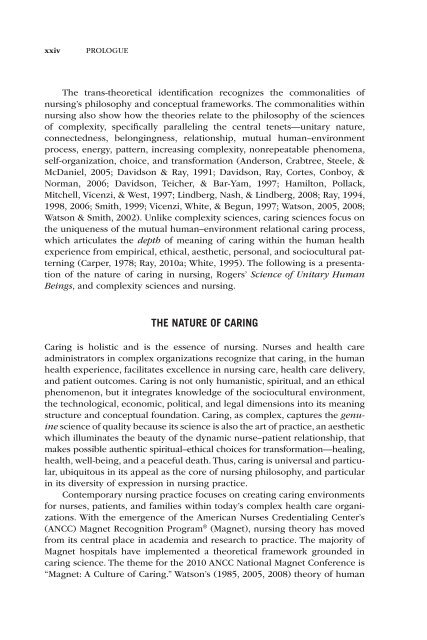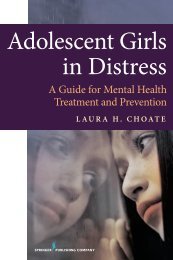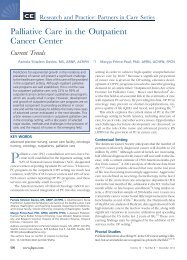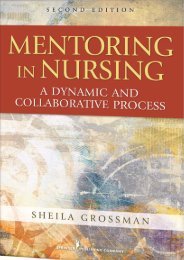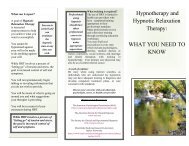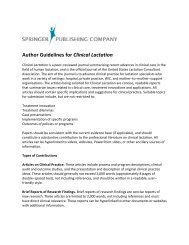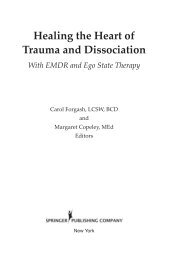Nursing, Caring, and Complexity Science: For Human ... - Axon
Nursing, Caring, and Complexity Science: For Human ... - Axon
Nursing, Caring, and Complexity Science: For Human ... - Axon
Create successful ePaper yourself
Turn your PDF publications into a flip-book with our unique Google optimized e-Paper software.
xxiv<br />
prologue<br />
The trans-theoretical identification recognizes the commonalities of<br />
nursing’s philosophy <strong>and</strong> conceptual frameworks. The commonalities within<br />
nursing also show how the theories relate to the philosophy of the sciences<br />
of complexity, specifically paralleling the central tenets—unitary nature,<br />
connectedness, belongingness, relationship, mutual human– environment<br />
process, energy, pattern, increasing complexity, nonrepeatable phenomena,<br />
self-organization, choice, <strong>and</strong> transformation (Anderson, Crabtree, Steele, &<br />
McDaniel, 2005; Davidson & Ray, 1991; Davidson, Ray, Cortes, Conboy, &<br />
Norman, 2006; Davidson, Teicher, & Bar-Yam, 1997; Hamilton, Pollack,<br />
Mitchell, Vicenzi, & West, 1997; Lindberg, Nash, & Lindberg, 2008; Ray, 1994,<br />
1998, 2006; Smith, 1999; Vicenzi, White, & Begun, 1997; Watson, 2005, 2008;<br />
Watson & Smith, 2002). Unlike complexity sciences, caring sciences focus on<br />
the uniqueness of the mutual human–environment relational caring process,<br />
which articulates the depth of meaning of caring within the human health<br />
experience from empirical, ethical, aesthetic, personal, <strong>and</strong> sociocultural patterning<br />
(Carper, 1978; Ray, 2010a; White, 1995). The following is a presentation<br />
of the nature of caring in nursing, Rogers’ <strong>Science</strong> of Unitary <strong>Human</strong><br />
Beings, <strong>and</strong> complexity sciences <strong>and</strong> nursing.<br />
The Nature of <strong>Caring</strong><br />
<strong>Caring</strong> is holistic <strong>and</strong> is the essence of nursing. Nurses <strong>and</strong> health care<br />
administrators in complex organizations recognize that caring, in the human<br />
health experience, facilitates excellence in nursing care, health care delivery,<br />
<strong>and</strong> patient outcomes. <strong>Caring</strong> is not only humanistic, spiritual, <strong>and</strong> an ethical<br />
phenomenon, but it integrates knowledge of the sociocultural environment,<br />
the technological, economic, political, <strong>and</strong> legal dimensions into its meaning<br />
structure <strong>and</strong> conceptual foundation. <strong>Caring</strong>, as complex, captures the genuine<br />
science of quality because its science is also the art of practice, an aesthetic<br />
which illuminates the beauty of the dynamic nurse–patient relationship, that<br />
makes possible authentic spiritual–ethical choices for transformation—healing,<br />
health, well-being, <strong>and</strong> a peaceful death. Thus, caring is universal <strong>and</strong> particular,<br />
ubiquitous in its appeal as the core of nursing philosophy, <strong>and</strong> particular<br />
in its diversity of expression in nursing practice.<br />
Contemporary nursing practice focuses on creating caring environments<br />
for nurses, patients, <strong>and</strong> families within today’s complex health care organizations.<br />
With the emergence of the American Nurses Credentialing Center’s<br />
(ANCC) Magnet Recognition Program ® (Magnet), nursing theory has moved<br />
from its central place in academia <strong>and</strong> research to practice. The majority of<br />
Magnet hospitals have implemented a theoretical framework grounded in<br />
caring science. The theme for the 2010 ANCC National Magnet Conference is<br />
“Magnet: A Culture of <strong>Caring</strong>.” Watson’s (1985, 2005, 2008) theory of human


